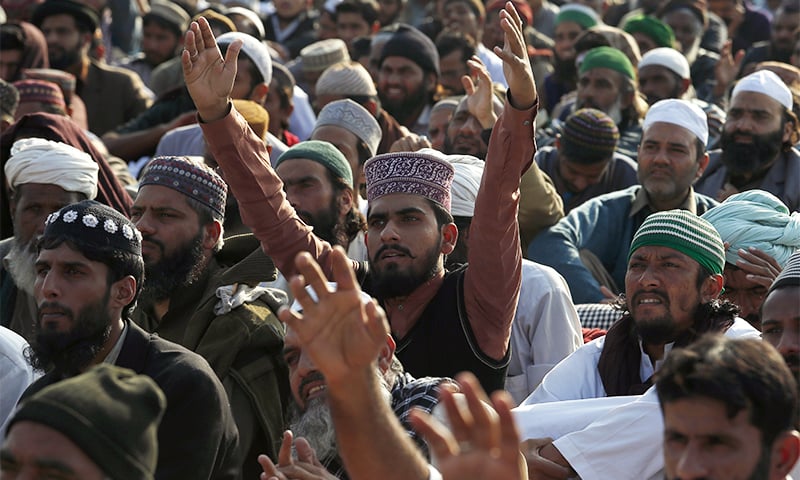News Analysis |
The Interior Minister, Ahsan Iqbal, gave the final warning to the protestors in Islamabad to disperse on Friday night. The Islamabad High Court had also ordered the district administration to clear the area by Saturday morning.
The protestors of a religious party have blocked the federal capital’s busy Faizabad Interchange and demanded the resignation of the law minister for his alleged role in ‘altering’ the Khatm-e-Nabuwwat laws.
The government had given the protestors a last warning to go away before 10 pm on Friday. Before the deadline expired the Interior Minister held a press conference and tried to persuade the protesters to disperse.
The state needs to remember that it has to deal with the religious hardliners but without surrendering, and, also, without repeating a Model Town like a tragedy.
“I assure that there is no shortcoming in the Khatm-e-Nabuwwat laws and a gap that had been created after 2002 has also been filled forever. Therefore, there is no reason this sit-in should continue and be allowed to disrupt people’s lives”, the minister clarified.
He also appreciated the protestors for showing off their love for their Prophet (PBH). “I appreciate your sentiment: you are here to safeguard your love for Prophet Muhammad. However, this country, its parliament, government and armed forces are here to safeguard the finality of prophethood,” he said.
Read more: Rawalpindi-Islamabad residents helpless as police fail to dislodge protesters from Faizabad…
The reason behind the blockade of the federal capital by a religious group of people is largely a political one. Apparently, they intend to seek attention, support, and sympathy if the state decides to use force against the protestors. Religious parties generally follow a trend of shaping narratives on the name of martyrs.
Mumtaz Qadri, the man who murdered the serving governor of Pakistan’s largest province, Punjab, is glorified by the same group and the state itself is held responsible for his ‘planned murder’. Ironically, it is often publically promised by the devotees to follow the footsteps of Qadri without any fear or respect for the country’s constitution.
The Interior Minister, Ahsan Iqbal, gave the final warning to the protestors in Islamabad to disperse on Friday night.
The state remained almost absent when the movement was at its earliest stage. There was a time when this group had no significant number of followers, nor did it have a strong narrative. With the passage of time, however, the group managed to launch itself as a political party which is said to be the guardians of Islam and Pakistan.
Read more: Islamabad under siege as Khatam-e-Nubuwat protest continue
This forum has maintained that the state must not surrender before a small number of people who actually want to control the complete system of the state. The state needs to remind the group of its own powers and right over the use of force. But it is also important to note that any action by the government that is not rationally understood and evaluated will lead towards more chaos and disorganization. The state needs to remember that it has to deal with the religious hardliners but without surrendering, and, also, without repeating a Model Town like a tragedy.
The modern state has both soft as well as hard power. It has artillery as well as books, media and now social media to control the minds of people. It can and it should work on the proper usage of its soft power in order to pacify the angry men and women who are made to believe that the state no longer cares about their faith.
Before the deadline expired the Interior Minister held a press conference and tried to persuade the protesters to disperse.
The use of hard power will play its part in exacerbating tensions. Therefore, it is in the best interest of the state to negotiate with the leaders of the movement and convince them that the state cannot be terrorized by a few hundred people protesting at the roads of the federal capital.
Read more: Aggression in the region: Islamabad all-set to draw support against the…
Moreover, Pakistan needs a comprehensive policy framework to deal with her religious extremism problem. There is a dire need to recognize that firebrand clerics need the attention of the law enforcement agencies before they get so strong that they start challenging the state itself. Pakistan needs serious self-introspection in order to survive peacefully in the 21st century.














